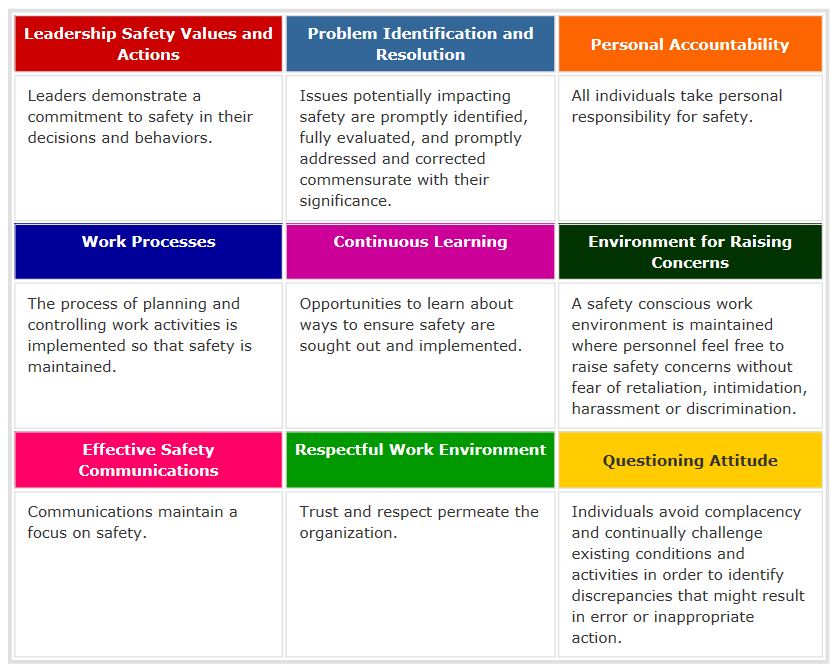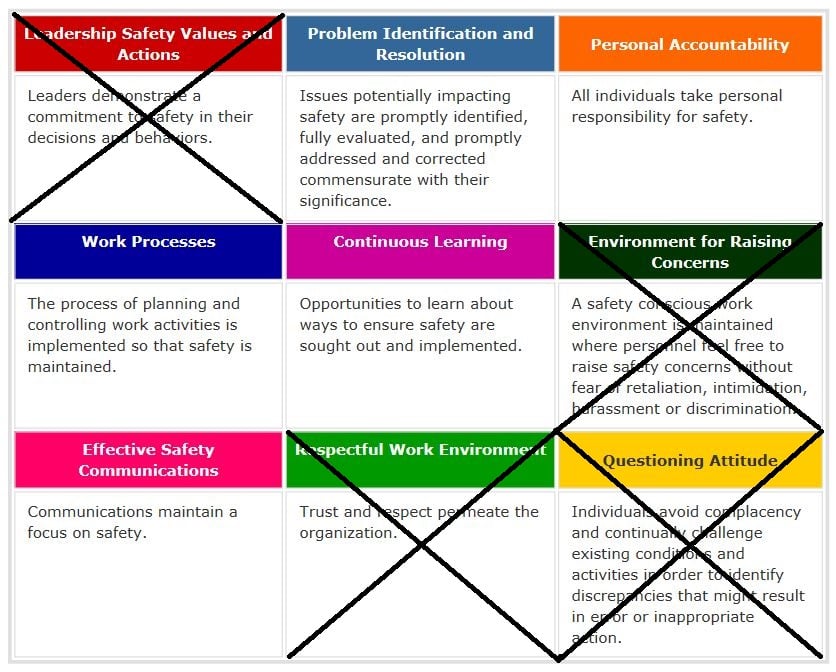Fission Stories #175
The Nuclear Regulatory Commission (NRC) issued a policy statement on June 14, 2011, stating how swell it would be if the owners of nuclear power plants established and maintained a positive safety culture. The NRC did not require that plant owners obtain and retain positive safety cultures, but expressed how important “a safety-first focus in nuclear work environments for public health and safety.”
Thus, the NRC is officially on record that positive safety cultures are swell and are important for public health and safety but has not taken any steps to require these swell and important things to be implemented.
NRC’s Safety Culture Traits
On its safety culture webpage, the NRC identifies nine very colorful traits needed for a positive safety culture. Like snowflakes, no two of the safety culture trait colors are the same. But because the NRC deems a positive safety culture as swell and important but not mandatory, plant owners need not collect any of these colored traits.
Pot, meet kettle. Or, kettle, meet pot. I’m not really sure which is the NRC and which is a plant owner.
Whether pot or kettle, the NRC is a few colors shy of having a positive safety culture itself. In late 2009, the NRC’s Office of the Inspector General (OIG) released a survey of the NRC’s safety culture. I submitted a request under the Freedom of Information Act for records regarding actions taken by the NRC in response to this safety culture survey.
(I submitted this request on March 22, 2013, but did not begin receiving the requested documents until nearly a year later. See Fission Stories #174 for additional information about the NRC violating federal statutes with its slow FOIA responses.)
NRC Focus Group Results
One of the records I eventually obtained from the lawbreaking NRC was a report by a focus group formed withing the NRC’s Region IV offices in Arlington, Texas, in response to the 2009 safety culture survey. This focus group report does not paint a very colorful picture of a positive safety culture. For example:
(1) The focus group considered the NRC’s Open Door Policy.
During the focus group discussions concerning the Open Door Policy, participants shared multiple occurrences in which retaliation was felt or trust was violated. For example, several experiences were shared in which a manager was approached via the Open Door policy due to issues with the participants’ immediate supervisor. In all shared experiences, the immediate supervisor was advised of the meeting and promptly confronted the staff member. The prompt confrontation response by the immediate supervisor suggests that not only did the manager share the fact that issues had been raised about the immediate supervisor but also identified the person(s) who raised them.
So, scratch out the “Respectful Work Environment” trait.
(2) The focus group probed the NRC’s non-concurrence process where any staffer can formally disagree with a position stated in a document he or she is asked to review.
Furthermore, many participants shared the belief that an unspoken understanding exists in which “You will concur.” Specifically, one individual stated, “the unwritten policy … is you will not — not concur.”
Okay, scratch out the “Questioning Attitude” trait (no questions asked).
(3) The focus group probed the NRC’s differing professional opinion (DPO) process where any staffer can formally disagree with a regulatory decision made by the agency.
The general feeling of some was that if the DPO were used, the end result would carry negative consequences especially if the DPO effort was unsuccessful. For example, one participant stated “I’ll never do it, it’s a black mark if I am not successful” and “If I made everyone work and don’t win, I will see repercussions.”
Well, scratch out the “Environment for Raising Concerns” trait.
(4) The focus group also examined management and leadership issues.
The focus group participants also shared the perception that not all managers really support the Open Door Policy.
Some also thought that the tone of the Region encourages misuse of staff.
Other staff participating in the focus group felt that a different set of rules applies to upper management than the rest of the staff. One individual shared an example involving the behavior of a manager at a facility [licensed by the NRC]. They concluded by saying, “if I would have done that, I would have been fired.”
During the focus group concerning the 2009 OIG safety culture and climate survey, participants felt that the survey will have little or no impact on changing the culture.
The Open, Collaborative Working Environment in Region IV is not meeting the intended vision and correction action is essential in addressing issues identified in this report.
Scratch out the “Leadership Safety Values and Action” trait, at least once.
Our Takeaway
The NRC identifies nine traits needed for a positive safety culture.
But perhaps a positive safety culture is not like baseball. Maybe you really don’t need nine in order to play. Perhaps only a handful of traits yields a positive safety culture.
What was I not thinking?
The NRC does not require that plant owners develop positive safety cultures at their facilities. Therefore, having NONE of the traits is as acceptable to the NRC as having all NINE. Because a positive safety culture is not mandatory, having all nine traits would not even win you an Open Door prize.
By any count or color, the NRC cannot be an effective and efficient safety regulator when its staff does not feel free to raise concern and lacks trust in their managers. If the agency’s workers do not trust NRC managers, why should the U.S. Congress or the American public trust them?
“Fission Stories” is a weekly feature by Dave Lochbaum. For more information on nuclear power safety, see the nuclear safety section of UCS’s website and our interactive map, the Nuclear Power Information Tracker.


